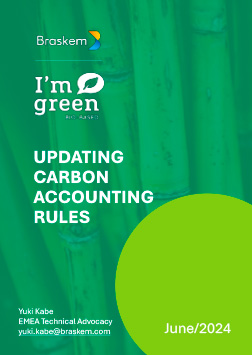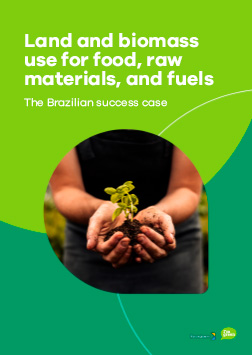Here you will find comprehensive resources for cutting-edge insights and in-depth analyses on sustainable practices, authored by Braskem's leading experts. At Braskem, we are dedicated to advancing sustainability through innovative solutions and practices that contribute to a more sustainable world — This is the essence of I'm green™ bio-based.
Our collection of technical papers offers valuable information and inspiration for sustainable development professionals, researchers, policymakers, marketers and anyone interested in sustainable practices and in learning more about the discussions involving our I'm green™ bio-based portfolio. Join us in exploring the innovative approaches and solutions that position Braskem as a leader in sustainability.

Braskem’s commitment to net zero starts with ensuring that we capture carbon not just in our materials, but also in our methodologies.
Braskem supports a necessary review and change of the Product Environmental Footprint (PEF). Namely, the introduction of the -1/+1 approach for carbon accounting to incorporate biogenic carbon transparently and accurately into the methodology.
The biogenic carbon cycle is a circular carbon cycle that maintains the balance between carbon on earth and carbon in the atmosphere. It is our ability and responsibility to preserve this carbon cycle that will ensure that we reach net zero by 2050. In order to do this, we need the -1/+1 approach.
So, what is the -1/+1 methodology and why is it so important? Our Technical Advocacy Specialist in Life Cycle Assessments and Sustainability, Yuki Kabe, has written a technical briefing paper detailing the methodological debate, read it here!

The journey of the I’m green™ bio-based starts in the heart of Brazilian farmland in the centre-south of the country. Our sustainability claims are founded on sourcing ethanol from sugarcane grown far away from biodiversity-rich areas like the Amazon rainforest by farms with fair working conditions, and protections for biodiversity in place. While our sugarcane is responsibly sourced, concerns persist regarding the potential impact of expanding bio-based plastic production on the food supply chain . In this paper, we demonstrate that bio-based plastics can be sustainably produced from primary biomass sources, such as sugarcane without negatively affecting food production.
Our advocacy expert on sustainable sourcing Martin Clemesha team shows in this paper that bio-based plastics can be sustainably produced from primary sources of biomass, such as sugarcane, if:
Enjoy the reading and if you would like to learn more about any of the topics, please contact us .